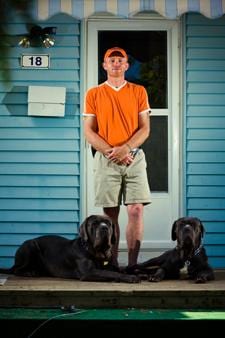Shawn King looks out from the porch of his blue, two-storey house. He surveys the deserted neighbourhood, with its cracked streets laced with potholes and the odd house boarded up because of vandalism.
King is packing up his life and struggling with the loss of longtime boyfriend Rick Frenette. He is one of the last residents on the soon-to-be defunct Canadian Forces Base Rockcliffe near the Ottawa River.
“Once I get my shit organized and drive out of this driveway for the last time, I can’t come back and see where Rick and I spent our lives,” King says. “This was our life. Once everything is sorted out and ploughed under, there’s going to be nothing left. It’s heartbreaking for me.”
The 136-hectare base, which once housed hundreds of military homes, officially closed July 31, leaving only King and two families behind. He was granted an extra month because of Frenette’s death — due to a sudden stroke — about six weeks ago.
The tanned, slim King faces his freshly mowed front lawn. He’s wearing a baseball cap with “Support our troops” stenciled along the rim. Two gull-winged vintage Bricklin cars sit in the driveway.
“It is ironic that, technically, the first year that I moved onto the base, I met Rick,” King says of his 11 years here. “The last year, I have to move off — that’s when he passes away. It’s been hard.”
They first met at Club Polo in the late 1990s. A handsome stranger overheard King say “Oh God, he’s hot!”
Frenette, by way of introduction, told King to remember that he was the top. When the night finished, King played hard to get. The next week, they met at Polo again. King explained it was his birthday, and took Frenette home.
A year later, Frenette moved in, following in the tradition of the hundreds of military families that had occupied the base since the early 1950s. Rockcliffe is 90 years old.
The Department of National Defence decommissioned the base in 1994. In November 2005, the federal government approved the site’s disposal. The base has been slowly closing ever since. National Defence recently decided to finally pull the plug on the last homes, one year ahead of schedule, to save on the enormous maintenance and heating costs.
With the base closure imminent, there was talk of the land being used for an eco-friendly redevelopment of mixed housing. A First Nations land claim, though, halted the land sale in 2007. Despite CFB Rockcliffe still being under this claim, King thinks the Canada Lands Company, the Crown Corporation developing the land, will sell it.
King, a small-town boy from St Marys, Ontario, enlisted in the military after high school to avoid working in factories. He came out in Ottawa in 1997, having been stationed in Cornwallis, Kingston, and CFB Trenton, and having done a six-month tour in Golan Heights, where he suffered a back injury. Around the time they met, Frenette shattered his ankle in an accident at his downtown apartment.
Eventually, King resigned as military communications operator because of his back injury, trading in his army colours for civilian ones.
“The atmosphere has gotten 100 percent better since I got in. Gays and lesbians are openly allowed in the military. A lot of people I work with, they’ll tell a gay joke — I don’t have issues with it. I’m not one of these people ‘Oh my God, I heard something, now I’m offended!'”
Frenette’s injury meant that he didn’t have steady employment. He decided to start refurbishing antique Bricklins, beginning a passionate hobby for the couple. Manufactured in New Brunswick in the 1970s, Malcolm Bricklin’s cars, famous for the unusual location of their door hinges, made an indelible stamp on pop culture as the car in the Back to the Future films.
Presently, a Canadian flag and a rainbow flag flap on a breeze in front of the house. A helicopter flies overhead. Devin, one of King’s Neapolitan mastiffs, lies on the porch. Diesel, the other mastiff, presses his snout to the screen door behind King. He and Frenette got the dogs a few years ago after some attempted break-ins threatened their eight-car garage down the road.
King is touched by the support he’s received from his military colleagues since Frenette’s death.
“If I would’ve thought, say 15 years ago, that I’d have people in the military right there, supporting me because I’d lost my spouse, [that] they’d treat me no different than if it was a straight relationship, I’d have said ‘No.'”
“Even some of the old guys that were in the military for years in their sixties and seventies, they’d come up and give me a hug and say ‘Hang in there. If you need to talk, call me.’ Twenty years ago they wouldn’t even consider that, let alone even speak to you — once they knew that you were gay.”
“I’m trying to deal with Rick passing away,” King says. “Eleven years is a long time to live with somebody and see them everyday. I don’t think I’ve had time to fully mourn his loss. As soon we laid him to rest, I had to get my ass in gear and start deciding what I’m going to do. I’m looking forward to that day when things have settled down and I can actually sit down and reflect and have a good cry.”


 Why you can trust Xtra
Why you can trust Xtra


